外研版必修五Module 2 A Job Worth Doing - Grammar课件(41张)
文档属性
| 名称 | 外研版必修五Module 2 A Job Worth Doing - Grammar课件(41张) | 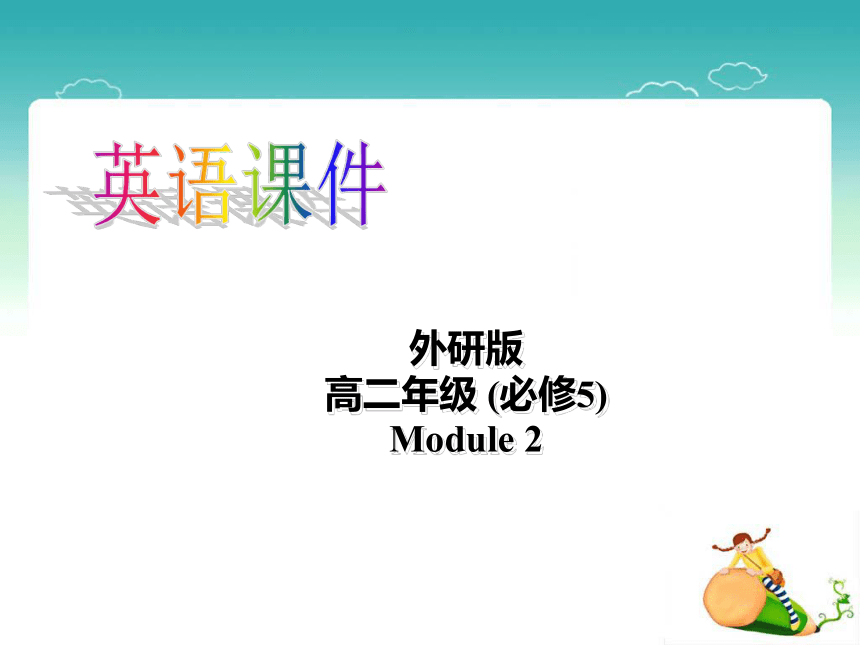 | |
| 格式 | zip | ||
| 文件大小 | 549.6KB | ||
| 资源类型 | 教案 | ||
| 版本资源 | 外研版 | ||
| 科目 | 英语 | ||
| 更新时间 | 2019-07-16 20:30:03 | ||
图片预览

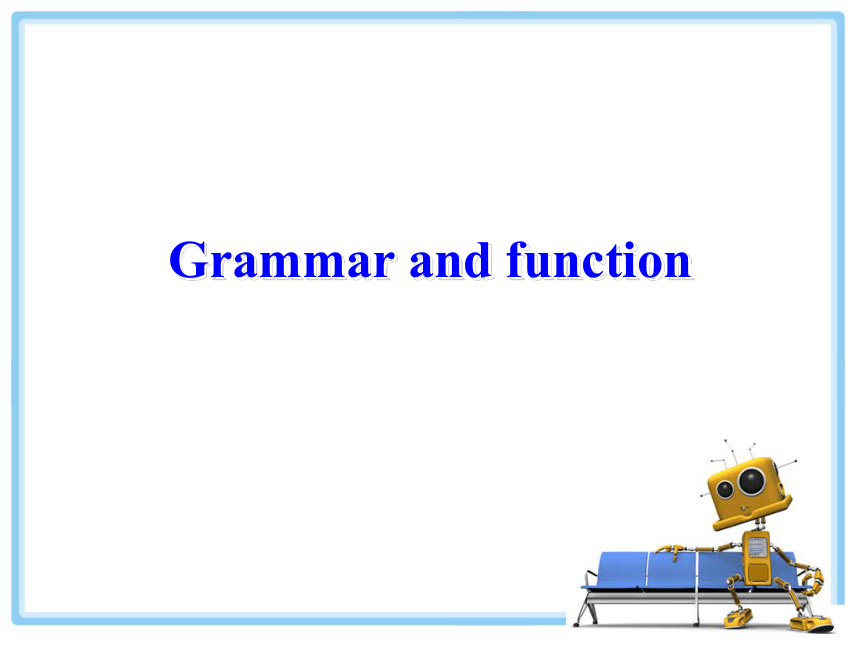
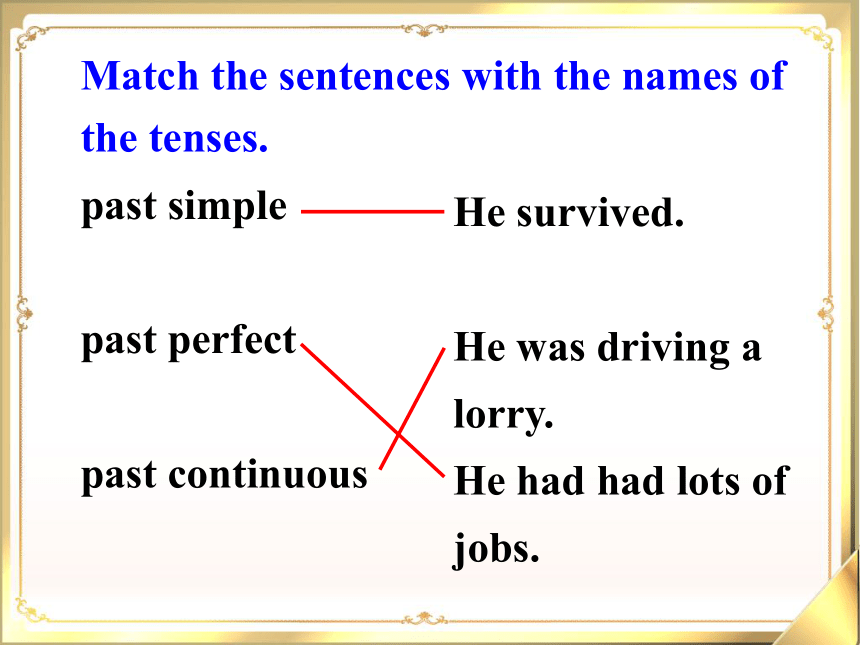
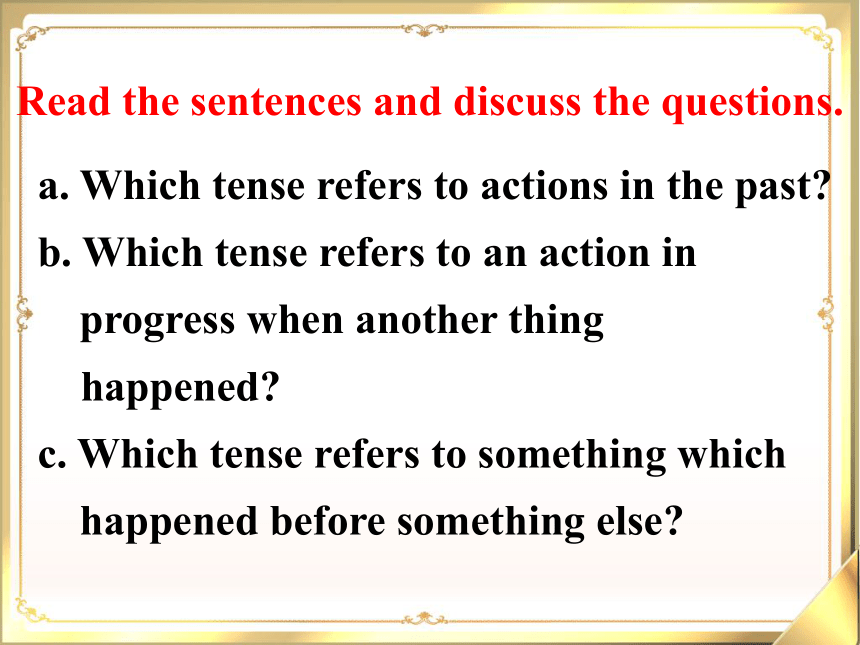
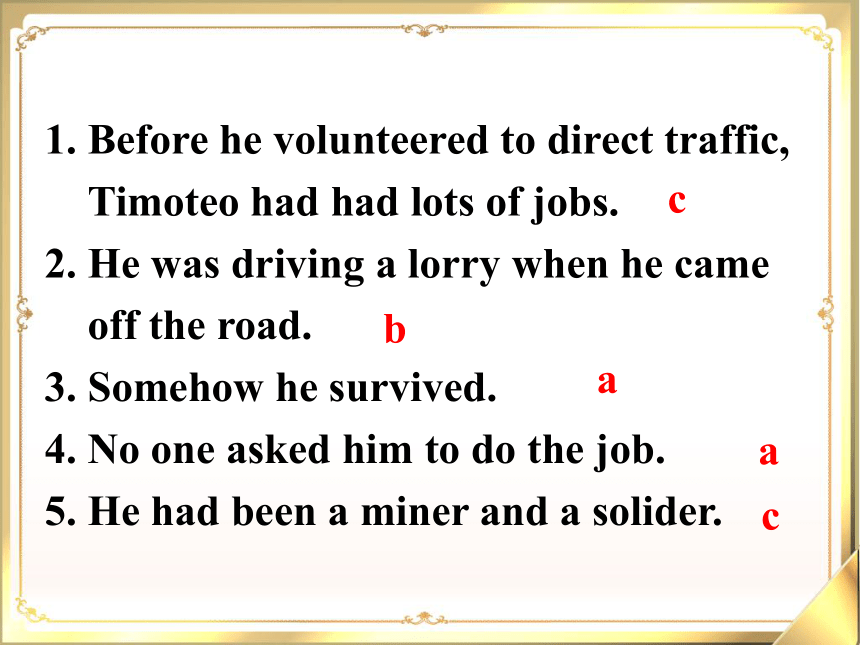
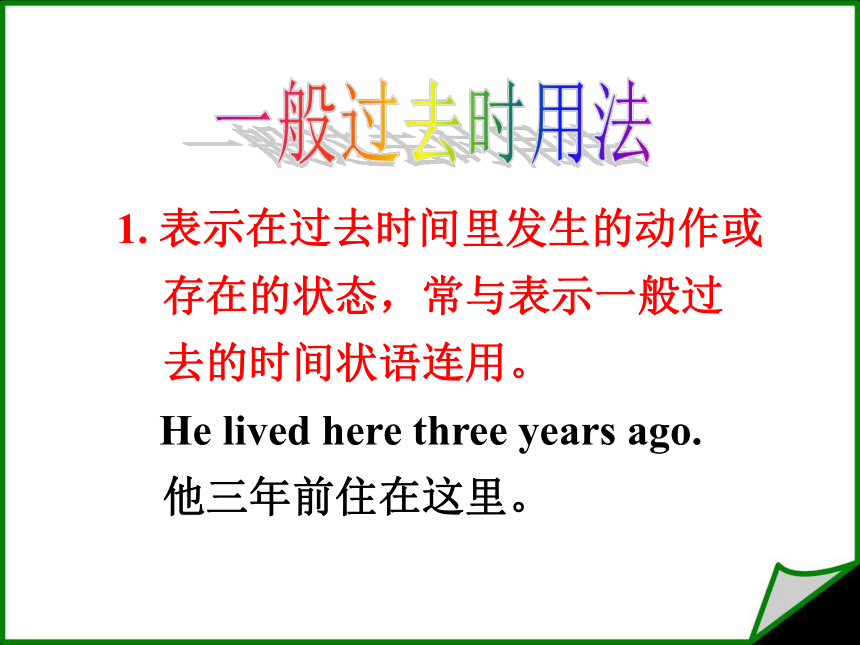
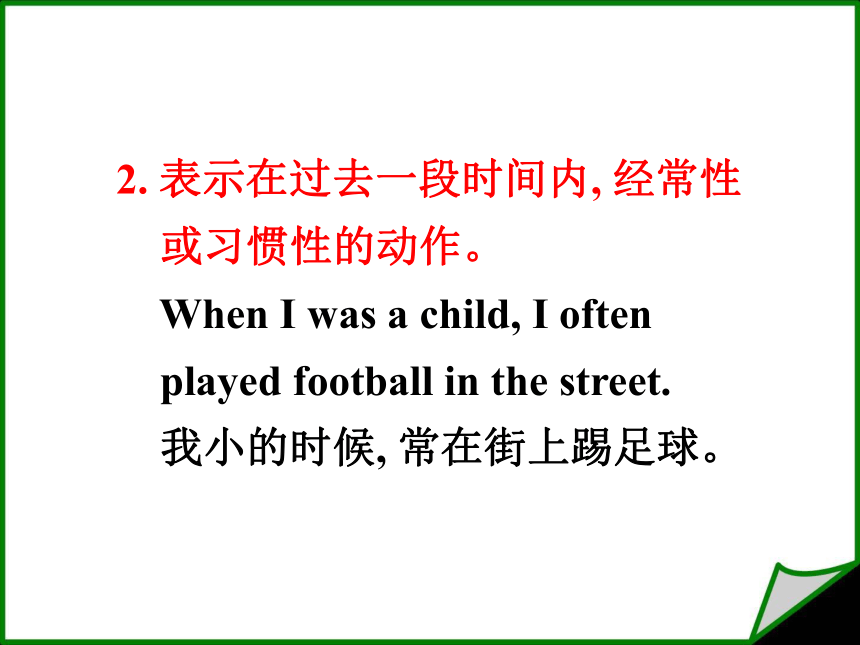
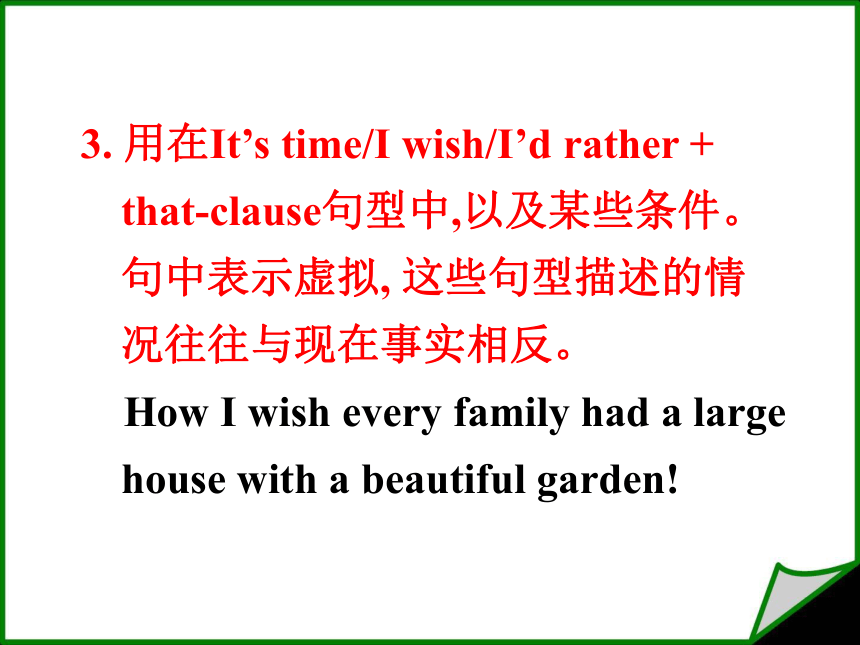


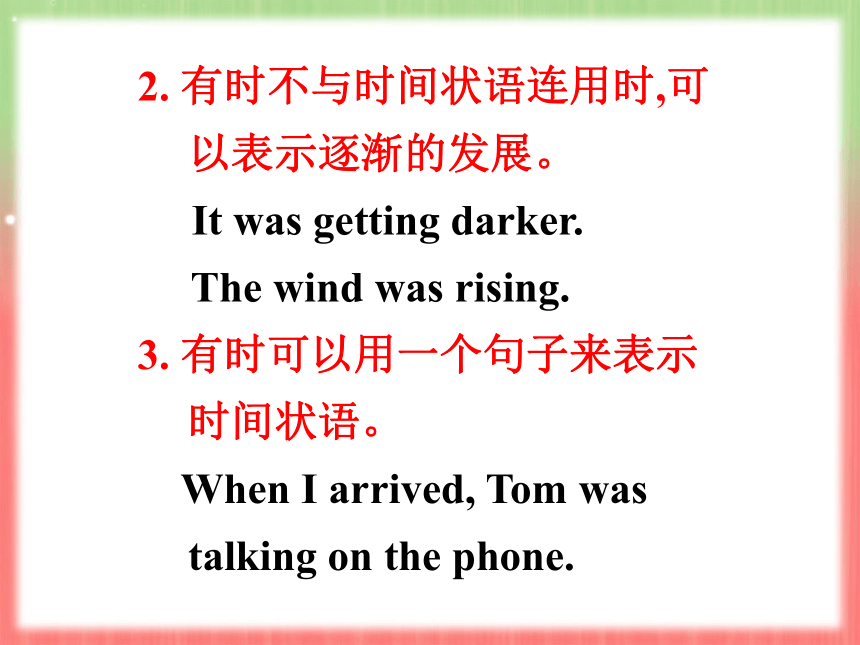
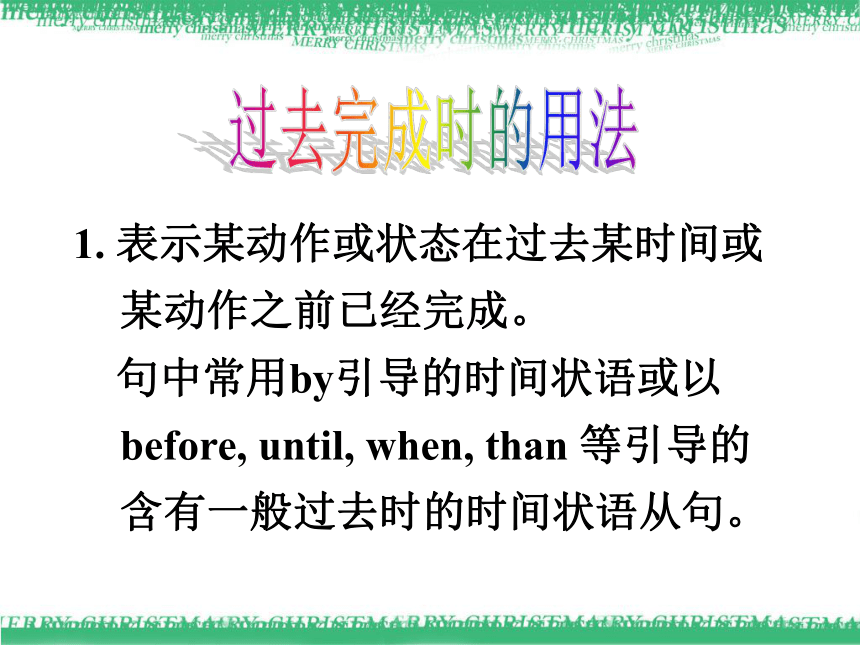
文档简介
课件41张PPT。英语课件外研版
高二年级 (必修5)
Module 2 Grammar and functionMatch the sentences with the names of the tenses.past simple
past perfect
past continuousHe survived.
He was driving a lorry.
He had had lots of jobs.Read the sentences and discuss the questions.a. Which tense refers to actions in the past?
b. Which tense refers to an action in progress when another thing
happened?
c. Which tense refers to something which happened before something else?1. Before he volunteered to direct traffic, Timoteo had had lots of jobs.
2. He was driving a lorry when he came off the road.
3. Somehow he survived.
4. No one asked him to do the job.
5. He had been a miner and a solider.cbaac1. 表示在过去时间里发生的动作或存在的状态,常与表示一般过去的时间状语连用。
He lived here three years ago. 他三年前住在这里。一般过去时用法2. 表示在过去一段时间内, 经常性或习惯性的动作。
When I was a child, I often played football in the street. 我小的时候, 常在街上踢足球。3. 用在It’s time/I wish/I’d rather + that-clause句型中,以及某些条件。句中表示虚拟, 这些句型描述的情况往往与现在事实相反。
How I wish every family had a large house with a beautiful garden! 4. 可以根据上下文的语境要求,使用 一般过去时。
--- Long time to see! Haven’t you
graduated from college?
--- Yes. I studied English for four
years in Nanjing.过去进行时主要用来表示在过去延续了一段时间的动作。
They were expecting you yesterday.他们昨天一直在等你。过去进行时用法2. 有时不与时间状语连用时,可以表示逐渐的发展。
It was getting darker.
The wind was rising.
3. 有时可以用一个句子来表示时间状语。
When I arrived, Tom was talking on the phone. 1. 表示某动作或状态在过去某时间或某动作之前已经完成。
句中常用by引导的时间状语或以before, until, when, than 等引导的含有一般过去时的时间状语从句。过去完成时的用法By 5:00 yesterday morning we had finished that work. 到昨天早上5点钟时, 我们已经做完了工作。2. 表示某动作或状态在过去某时刻前已 经开始, 持续到这一过去时间, 并可能
持续下去。
John and Jane had known each other
for a long time before their marriage. 约翰和简在结婚前就认识很长时间了。3. 用在if引导的与过去事实相反的条件句以及wish, as if引导的从句中。
If she had worked hard, she would have succeeded. 要是她努力的话, 她就会成功了。 (事实上她没努力,也没成功。)4. 常用hardly/scarcely/barely... when...,;no sooner ...than...等结构中, 表示“刚刚……就……”。
Hardly had he begun to speak, the audience interrupted him.
他刚开始演讲, 听众就打断了他。5. intend, think,?hope,?want,?mean等动词用过去完成时, 表示过去未曾实现的打算或意图。
I had meant to take a good holiday this year, but I wasn’t able to get away. 我本来打算今年好好休个假, 但是我不能离开了。Mary wrote a letter to her friend last night.
Mary was writing a letter to her friend last night.They had done the work at five o’clock.
They did the work at five o’clock.— You look very tired. _____at all
last night?
— No, not really. I’m tired out now.
A. Do you sleep
B. Were you sleeping
C. Did you sleep
D. Had you sleptPractice2. John, a friend of mine, who got married only last week, spent$3,000 more than he _____ for the wedding.
A. will plan B. has planned
C. would plan D. had planned3. The young girl sitting next to me on the plane was very nervous. She ______ before.
A. hasn’t flown
B. didn’t fly
C. hadn’t flown
D. wasn’t flying4. My cousin went to Canada two years ago. He _____ there for a few months and then went to America.
A. worked
B. would work
C. would be working
D. has been working5. I ____ along the street looking for a place to park when the accident ___.
A. went; was occurring
B. went; occurred
C. was going; occurred
D. was going; had occurred6. I _____ in London for many years, but
I’ve never regretted my final decision
to move back to China.
A. lived B. was living
C. have lived D. had livedFunction英语中, 表示对过去某种情况进行推测或对已发生的动作或存在的状态进行推测时, 常用情态动词must, may (might), can(could), should (ought to), would等+have+过去分词表示。依据说话人的语气或推测的把握程度不同, 使用的情态动词也不同。“情态动词+have+过去分词”的用法1. must+have+过去分词
表示对过去发生的动作或存在的状态的肯定判断。用于肯定的陈述句中(在否定句及疑问句中用can代替must), 意思是“一定已经……”。
e.g. If he had really been there, I
must have seen him. 2. can (could)+have+过去分词
表示对过去发生的动作或存在的状态的否定或疑问判断。
Where can he have gone? 他可能去哪里了呢?
Jim can’t have been at home yesterday.
吉姆昨天不可能在家。 3. may/might+have+过去分词
表示对过去发生的动作或存在的状态进行的不肯定的推测, 语气比使用can (could)弱。might的语气比may更弱。
She may have read the book.
He might not have got your letter.4. need+have+过去分词
常用于否定句, 表示过去做了不必做或不需要做的事情, 表示“本来不必……”。
You needn’t have told him the news.
你没有必要告诉他那消息。5. should/ought to+have+过去分词
肯定式表示“过去本应做某事(但没做)”;否定式表示“过去不该做某事(但做了)”,含有不满或责备之意。
You’re right. I should have thought of that.
She ought to have come earlier.6. would+have+过去分词
表示过去本来要做某事却因某种原因未做, 用来说明某种情况, 不含有责备之意。
I would have written to you earlier but I have been ill. 我本来要早点给你写信, 但我生病了。If I had seen the advertisement, I would have applied for the job. 我要是看见那个广告了, 我就申请那份工作了。A: I visited China last year
B: That ______________ very interesting.
A: Not really. I still had to look after a group of French children who were visiting China.
B: That ______________ easy!PracticeComplete the dialogue with the correct words and phrases.must have beencan’t have beenA: No, it was a nightmare.
B: They _____ have got lost, or had an accident.
A: Yes, but luckily there were no disasters.
I managed somehow.might1. John _____ a better job, but he was too careless. A. should do B. must have done C. could do D. could have done
2. -- I don’t know why he is late.
-- Nor do I. He __ have had an accident. A. can B. should C. might D. must 3. He must have seen the inspector last night, ____ he? A. mustn’t B. hasn’t C. didn’t D. doesn’t
4. --Mary looks sad. Did you tell her
about the accident? --Yes, but I ____ have told her. A. should B. shouldn’t C. must D. ought to not5. The playground is all wet. It ___ rained last night. A. had B. can have C. should have D. must have
6. We _____ have hurried. We had to wait twenty minutes before the meeting began. A. needn’t B. should C. must D. couldn’t 7. -- Who told you my address? --I don’t remember clearly. It __ Tom. --It ____ Tom. He doesn’t know it. A. may have been; can’t be B. can be; mustn’t be C. must have been; can’t have been D. may have been; mustn’t have been8. John passed the exam. He didn’t study very hard. The exam __ difficult. A. can’t have been B. must have been C. couldn’t be D. might have been
9. She ____ have gone to college, but she didn’t pass the exam. A. might B. would C. must D. need10. It’s already eleven o’clock. He _____to bed. A. must have gone B. must go C. should have gone D. can’t have gone
高二年级 (必修5)
Module 2 Grammar and functionMatch the sentences with the names of the tenses.past simple
past perfect
past continuousHe survived.
He was driving a lorry.
He had had lots of jobs.Read the sentences and discuss the questions.a. Which tense refers to actions in the past?
b. Which tense refers to an action in progress when another thing
happened?
c. Which tense refers to something which happened before something else?1. Before he volunteered to direct traffic, Timoteo had had lots of jobs.
2. He was driving a lorry when he came off the road.
3. Somehow he survived.
4. No one asked him to do the job.
5. He had been a miner and a solider.cbaac1. 表示在过去时间里发生的动作或存在的状态,常与表示一般过去的时间状语连用。
He lived here three years ago. 他三年前住在这里。一般过去时用法2. 表示在过去一段时间内, 经常性或习惯性的动作。
When I was a child, I often played football in the street. 我小的时候, 常在街上踢足球。3. 用在It’s time/I wish/I’d rather + that-clause句型中,以及某些条件。句中表示虚拟, 这些句型描述的情况往往与现在事实相反。
How I wish every family had a large house with a beautiful garden! 4. 可以根据上下文的语境要求,使用 一般过去时。
--- Long time to see! Haven’t you
graduated from college?
--- Yes. I studied English for four
years in Nanjing.过去进行时主要用来表示在过去延续了一段时间的动作。
They were expecting you yesterday.他们昨天一直在等你。过去进行时用法2. 有时不与时间状语连用时,可以表示逐渐的发展。
It was getting darker.
The wind was rising.
3. 有时可以用一个句子来表示时间状语。
When I arrived, Tom was talking on the phone. 1. 表示某动作或状态在过去某时间或某动作之前已经完成。
句中常用by引导的时间状语或以before, until, when, than 等引导的含有一般过去时的时间状语从句。过去完成时的用法By 5:00 yesterday morning we had finished that work. 到昨天早上5点钟时, 我们已经做完了工作。2. 表示某动作或状态在过去某时刻前已 经开始, 持续到这一过去时间, 并可能
持续下去。
John and Jane had known each other
for a long time before their marriage. 约翰和简在结婚前就认识很长时间了。3. 用在if引导的与过去事实相反的条件句以及wish, as if引导的从句中。
If she had worked hard, she would have succeeded. 要是她努力的话, 她就会成功了。 (事实上她没努力,也没成功。)4. 常用hardly/scarcely/barely... when...,;no sooner ...than...等结构中, 表示“刚刚……就……”。
Hardly had he begun to speak, the audience interrupted him.
他刚开始演讲, 听众就打断了他。5. intend, think,?hope,?want,?mean等动词用过去完成时, 表示过去未曾实现的打算或意图。
I had meant to take a good holiday this year, but I wasn’t able to get away. 我本来打算今年好好休个假, 但是我不能离开了。Mary wrote a letter to her friend last night.
Mary was writing a letter to her friend last night.They had done the work at five o’clock.
They did the work at five o’clock.— You look very tired. _____at all
last night?
— No, not really. I’m tired out now.
A. Do you sleep
B. Were you sleeping
C. Did you sleep
D. Had you sleptPractice2. John, a friend of mine, who got married only last week, spent$3,000 more than he _____ for the wedding.
A. will plan B. has planned
C. would plan D. had planned3. The young girl sitting next to me on the plane was very nervous. She ______ before.
A. hasn’t flown
B. didn’t fly
C. hadn’t flown
D. wasn’t flying4. My cousin went to Canada two years ago. He _____ there for a few months and then went to America.
A. worked
B. would work
C. would be working
D. has been working5. I ____ along the street looking for a place to park when the accident ___.
A. went; was occurring
B. went; occurred
C. was going; occurred
D. was going; had occurred6. I _____ in London for many years, but
I’ve never regretted my final decision
to move back to China.
A. lived B. was living
C. have lived D. had livedFunction英语中, 表示对过去某种情况进行推测或对已发生的动作或存在的状态进行推测时, 常用情态动词must, may (might), can(could), should (ought to), would等+have+过去分词表示。依据说话人的语气或推测的把握程度不同, 使用的情态动词也不同。“情态动词+have+过去分词”的用法1. must+have+过去分词
表示对过去发生的动作或存在的状态的肯定判断。用于肯定的陈述句中(在否定句及疑问句中用can代替must), 意思是“一定已经……”。
e.g. If he had really been there, I
must have seen him. 2. can (could)+have+过去分词
表示对过去发生的动作或存在的状态的否定或疑问判断。
Where can he have gone? 他可能去哪里了呢?
Jim can’t have been at home yesterday.
吉姆昨天不可能在家。 3. may/might+have+过去分词
表示对过去发生的动作或存在的状态进行的不肯定的推测, 语气比使用can (could)弱。might的语气比may更弱。
She may have read the book.
He might not have got your letter.4. need+have+过去分词
常用于否定句, 表示过去做了不必做或不需要做的事情, 表示“本来不必……”。
You needn’t have told him the news.
你没有必要告诉他那消息。5. should/ought to+have+过去分词
肯定式表示“过去本应做某事(但没做)”;否定式表示“过去不该做某事(但做了)”,含有不满或责备之意。
You’re right. I should have thought of that.
She ought to have come earlier.6. would+have+过去分词
表示过去本来要做某事却因某种原因未做, 用来说明某种情况, 不含有责备之意。
I would have written to you earlier but I have been ill. 我本来要早点给你写信, 但我生病了。If I had seen the advertisement, I would have applied for the job. 我要是看见那个广告了, 我就申请那份工作了。A: I visited China last year
B: That ______________ very interesting.
A: Not really. I still had to look after a group of French children who were visiting China.
B: That ______________ easy!PracticeComplete the dialogue with the correct words and phrases.must have beencan’t have beenA: No, it was a nightmare.
B: They _____ have got lost, or had an accident.
A: Yes, but luckily there were no disasters.
I managed somehow.might1. John _____ a better job, but he was too careless. A. should do B. must have done C. could do D. could have done
2. -- I don’t know why he is late.
-- Nor do I. He __ have had an accident. A. can B. should C. might D. must 3. He must have seen the inspector last night, ____ he? A. mustn’t B. hasn’t C. didn’t D. doesn’t
4. --Mary looks sad. Did you tell her
about the accident? --Yes, but I ____ have told her. A. should B. shouldn’t C. must D. ought to not5. The playground is all wet. It ___ rained last night. A. had B. can have C. should have D. must have
6. We _____ have hurried. We had to wait twenty minutes before the meeting began. A. needn’t B. should C. must D. couldn’t 7. -- Who told you my address? --I don’t remember clearly. It __ Tom. --It ____ Tom. He doesn’t know it. A. may have been; can’t be B. can be; mustn’t be C. must have been; can’t have been D. may have been; mustn’t have been8. John passed the exam. He didn’t study very hard. The exam __ difficult. A. can’t have been B. must have been C. couldn’t be D. might have been
9. She ____ have gone to college, but she didn’t pass the exam. A. might B. would C. must D. need10. It’s already eleven o’clock. He _____to bed. A. must have gone B. must go C. should have gone D. can’t have gone
